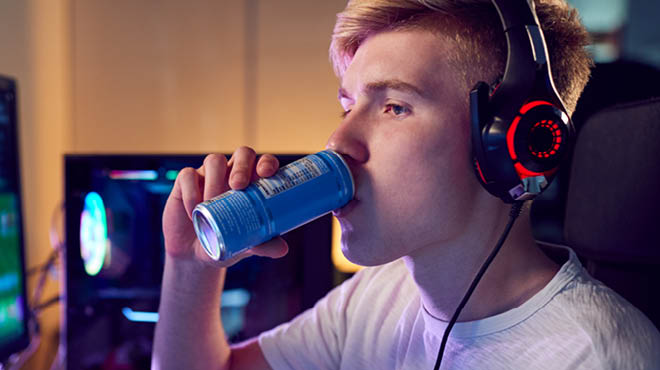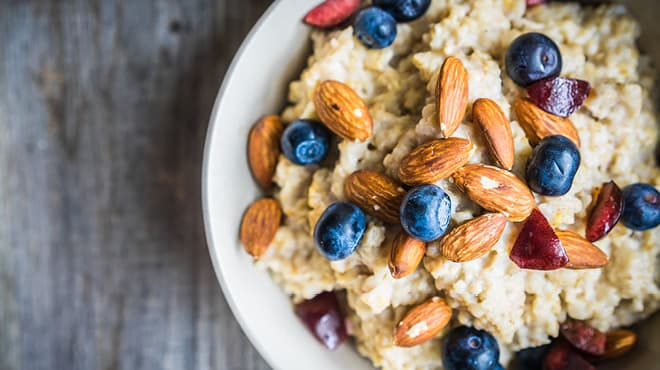What's the latest buzz on energy drinks?

About 90% of adults consume caffeine every day, making it the most common stimulant in the world. Widely available sources of caffeine include coffee, green and black tea, soft drinks, "energy shots," over-the-counter supplements, energy or protein bars, sports and energy drinks, chocolate, chewing gum and even ice cream.
Total sport and energy drink sales globally reached $193 billion in 2023. The U.S. is the No. 1 market, with people consuming nearly eight gallons of sports and energy drinks a year. These beverages are the second most popular dietary supplement among U.S. teens and young adults, behind multivitamins.
Caffeine guidelines
To give you an idea of how much daily caffeine consumption is safe, the Food and Drug Administration (FDA) made these recommendations:
- Adults: up to 400 milligrams of caffeine, the equivalent of two to three 12-ounce cups of coffee
- Pregnant or breastfeeding people: up to 200 milligrams
- Children: no safe limits set
The American Academy of Pediatrics discourages the consumption of caffeine and other stimulants by children and adolescents. In recent years, emergency departments have seen a rising trend of children being admitted due to overconsumption of caffeine, also known as caffeine toxicity. Symptoms include vomiting, high blood pressure, racing heart, heart rhythm problems, and, less commonly, disorientation and hallucinations.
So how do these recommended levels compare with typical energy drinks? Most energy drinks contain 100-300 milligrams of caffeine per serving, although amounts can vary.
Caffeine health effects
The positive health effects of caffeine vary from person to person, depending on the dose. These effects include:
- Improved reaction time, alertness and ability to concentrate.
- Lessened adverse effects of sleep deprivation.
- Protection against type 2 diabetes, heart attack and stroke.
- Reduced risk of Parkinson's disease; Alzheimer's disease; liver disease, including liver cancer; alcoholic cirrhosis and gout.
But caffeine also can have negative effects such as nervousness, insomnia, irritability and panic attacks. Those with preexisting anxiety disorders may be more susceptible to these effects.
Heavy caffeine use — more than 400 milligrams per day — can cause:
- Headache, insomnia, nervousness, irritability, fast heartbeat, palpitations, tremors, agitation and gastrointestinal upset.
- Increased risk of other addictive behaviors, like smoking and alcohol abuse.
- Physical and psychological dependence and withdrawal symptoms if intake is abruptly stopped.
The FDA notes that toxic effects, including seizures, can occur with rapid consumption of 1,200 milligrams of caffeine.
Not just caffeine
Many energy drinks contain other ingredients that can affect your health as well.
Sugar
Energy drinks can contain significant amounts of added sugar or other sweeteners. Because high intake of added sugar can contribute to health problems, the Dietary Guidelines for Americans recommends limiting it to no more than 10% of total daily calories.
For example, in a 2,000-calorie diet, no more than 200 calories — about 12 teaspoons — should come from added sugars. One 16-ounce can of Monster Energy Juice Pacific Punch supplies 210 calories and 47 grams of added sugar, which is equal to roughly 12 teaspoons. That's an entire day's worth of added sugar.
Other substances
Energy drinks may contain vitamins, minerals and amino acids.
Many also use herbal supplements, such as ginseng and guarana, which may be used to increase energy and mental alertness. Use caution with these substances since research on their safety and effectiveness is limited. Also, some herbal supplements can interact with prescriptions, so consult your healthcare professional before consuming them.
Keep in mind that even if a beverage is labeled "natural," that doesn't mean it's healthy. Adding vitamins, minerals and other substances doesn't make energy drinks healthier.
Safety of energy drinks
The FDA classifies energy drinks as dietary supplements and doesn't approve them before they're marketed. That means they aren't subjected to the same rigorous review process as prescription medications.
Manufacturers are responsible for safety, good manufacturing processes and truth in labeling.
Energy drink alternatives
If you've got the afternoon slumps, that doesn't necessarily mean you need a caffeine boost. You may be dehydrated. Dehydration can cause fatigue, dry mouth and skin, and nausea. It also can take a toll on your attention and short-term memory.
To hydrate, skip energy or sugary drinks or a cup of coffee or tea. Instead, try drinking plain water and eating hydrating foods like apples, berries, melons, celery and lettuce.
Brew a decaf iced latte at home
This coffee-shop-style decaf coffee drink is sweetened with brown sugar and almond syrup. You can use any other flavored syrup, such as hazelnut, or skip it. To make your latte plant-based, leave off whipped topping or use a whipped topping substitute. If you need to follow a gluten-free diet, check the syrup and whipped topping labels.
Iced latte
By Mayo Clinic Staff
Makes 4 servings
2 cups brewed decaffeinated espresso coffee, cooled
2 tablespoons light brown sugar
1 1/2 cups fat-free milk
2 tablespoons sugar-free almond syrup*
Ice cubes
1 cup fat-free whipped topping
1 teaspoon ground espresso beans
In a pitcher, combine the espresso, brown sugar, milk and syrup. Stir to mix evenly. Refrigerate until cold. Fill 4 glasses with ice cubes. Pour coffee over ice. Add 1/4 cup whipped topping to each drink and sprinkle with ground espresso beans.
Nutritional per serving (1 8-oz. glass): 84 calories, trace total fat, 11 grams sugar, 82 milligrams sodium, 18 grams carbohydrates, 3 grams protein, 0 grams fiber.
Roxanna Padilla is a registered dietitian in Nutrition Education and Counseling in Mankato, Minnesota.




